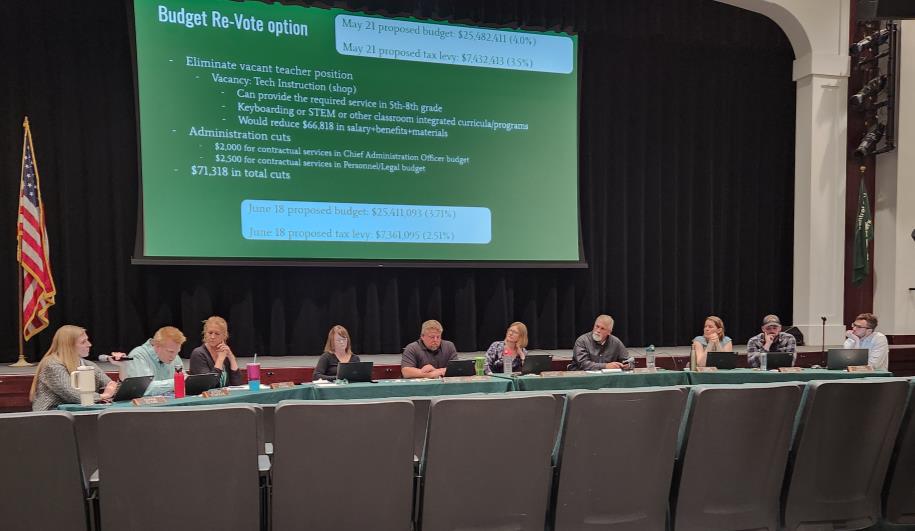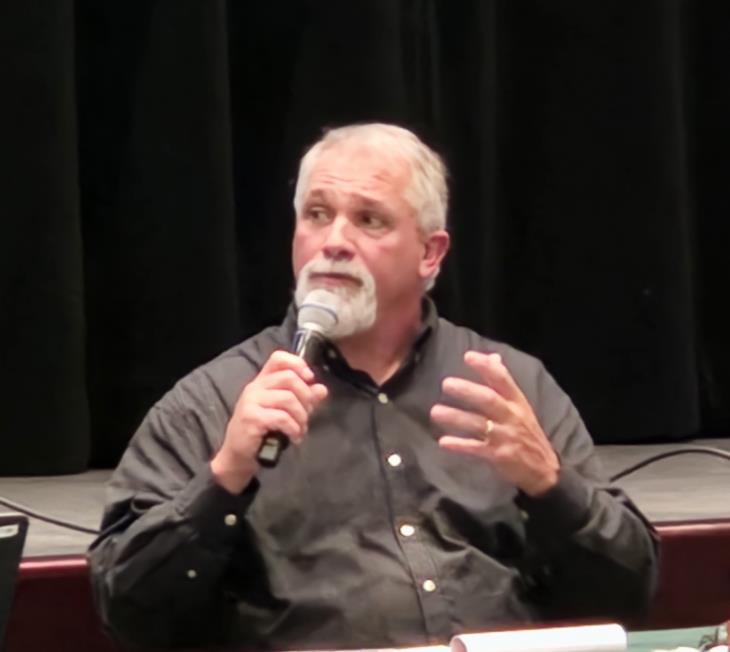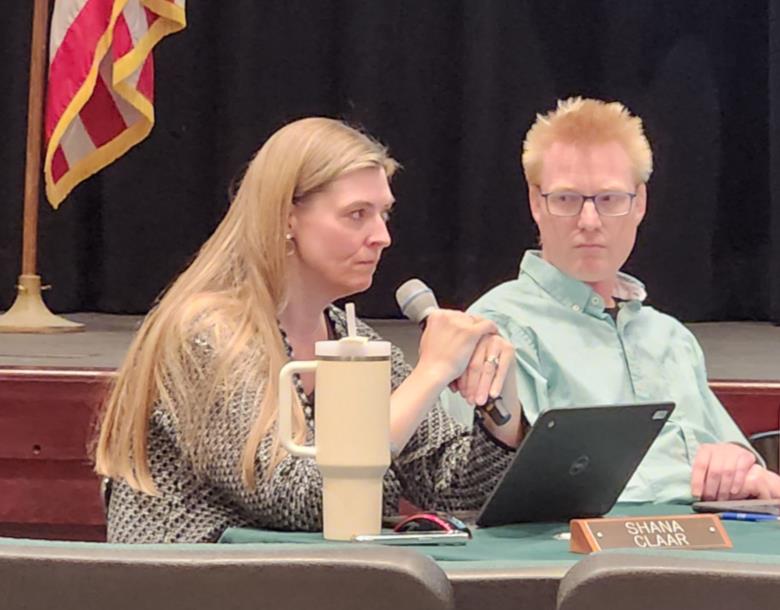Further, deeper cuts averted for now

by Robert Lynch; May 31, 2024
The Newfield Board of Education took a scalpel, not a meat axe to its once-failed school budget Thursday night. And when its nearly two-hour surgery had ended, the Board handed voters a pared-down spending plan that would raise next year’s tax levy 28 per cent less than would have the budget voters rejected May 21st by a mere 18 votes.
Spending in the $25,411,093 revised budget that the Newfield Board unanimously adopted Thursday stands only a fraction of a per cent (or $71,318) below that of the budget rejected in May. Yet it would increase the Newfield tax levy’s increase by only 2.5 per cent next year over that for the current year. The plan voters turned down last month would have hiked the levy by 3.5 per cent.
How Newfield administrators and the Board accomplished that reduction quelled much of the anxiety that was expressed through comments at a meeting only one week earlier. Sports programs need not be cut. Nor would music programs like high school band be eliminated. Elementary classroom sizes would not necessarily increase.
What would be impacted is a single upper-class-class program; today referred to as “Technology Instruction.” The old-fashioned term was “shop.” Though Newfield prides itself with having a large industrial arts area full of modern equipment, the shop will have no teacher next year. But then, again, it hasn’t had one for a while.
“It has been very difficult to fill,” School Superintendent Eric Hartz told Board members Thursday concerning his efforts to hire a teacher in technology instruction. Hartz said shop class hasn’t had a permanent instructor for the past three years.

So from a personnel standpoint, eliminating the shop teacher is painless. On the books, the job’s reduction saves the budget nearly $67,000 in salary and benefits.
Board members raised hypothetically some other more draconian cost-cutting measures during Thursday’s nearly two-hour discussion. But none of them gained traction. At least they won’t until after Newfield’s electorate renders its verdict in the June 18th budget re-vote.
The first-submitted 2024-25 Newfield Schools’ Budget was rejected last month by a relatively narrow margin; 248 votes (48.2%) supportive to 266 votes (51.8%) opposed. The margin of defeat pales by comparison to that in the district’s northeastern neighbor, the much-larger Ithaca City School District. On that same day in May, the Ithaca budget went down in flames with more than 70 per cent of voters opposing it.
And other differences stand between the two districts: Some are quantitative; others are qualitative and more difficult to grasp, unless one (like this writer) had heard the public comments and sensed the body language at post-mortem meetings conducted following this year’s budget defeats in both districts.
At $168.9 Million, the Ithaca City School District’s rejected budget was nearly seven times as large as Newfield’s. So cutting expenses by eliminating a position or two here and there doesn’t hold the same leverage in Ithaca as it does in Newfield.
Moreover, Ithaca’s tax hike began at a much-higher starting place. Ithaca’s rejected school budget had called for an 8.4 per cent annual rise in the tax levy. (It had earlier been proposed as high as 12 per cent.) Newfield’s increase was a mere 3.5 per cent. So closing a gap through minor cuts in Newfield proves far easier.
But there’s something else. While public complaints about the initial budgets have arisen in both districts, objections registered in Newfield during two recent meetings have seemed more muted, more nuanced, and to an extent, more balanced.
At Board sessions in Ithaca the afternoon following its failed budget referendum and again May 28th, not one resident stood up to defend its district’s rejected budget. It was different in Newfield. At the Newfield District’s two comparable meetings, budget critics and supporters held nearly equal sway.
“Programs here are amazing,” one Newfield parent told her school board Thursday. “It’s not perfect,” she acknowledged. “But we can’t get these without spending the money.”
Indeed, of the eleven people who addressed the Newfield Board of Education prior to its Thursday deliberations, nearly as many referenced the problem of school bullying as focused on the budget.
Indeed, when it came to district finances, one of the more frequent Newfield comments—even among some members of the Board—involved an earlier initiative to acquire an electric school bus with its up-front expenditure of about a half-million dollars. Its cost was to be partially abated through grant money.
The bus measure lost in the May referendum by a sizeable margin (218 votes to 299). Neither at last week’s nor at this week’s meetings did the School Board attempt to resubmit the bus purchase for a vote.
Should Newfield’s electorate reject the Board’s latest attempt to secure budget passage, state law requires the Board to impose a “Contingency Budget.” Such a budget would freeze the tax levy at this year’s level and impose program cuts to keep spending in line with the district’s ability to pay its bills.
“If the 2.5 (percent levy increase) doesn’t pass, you need to think what contingency looks like,” Superintendent Hartz warned. “Dollar for dollar, it doesn’t look like much,” Hartz stated, “But we lose a lot.”

While a contingency budget would lower the tax increase from 2.5 per cent to zero, the personnel and program cuts such a budget might dictate could prove far more painful than the ones engineered Thursday. Scenarios given greater consideration during the Board’s last meeting, May 23rd included the potential elimination of some or all sports programs, curtailing instrumental music instruction, and/or leaving multiple vacant teaching positions unfilled at the elementary or middle school levels.
But right now there’s no talk of layoffs.
“We’re not cutting anybody,” Hartz advised the Board concerning the technology instructional position. “We’re looking at someone we can attrition down.”
Although the full-time shop instructor job has remained vacant for years, someone has been teaching a class or two there recently. But that instructor is dual-certified in Special Education, and the Superintendent plans to reassign the teacher to Special Ed.
And although New York State mandates a certain amount of technology education, District officials plan some work-arounds. State rules are quite lenient in that area, School Board President Christina Ward stated after the meeting. Ward said math instructors may help fulfill the mandate. Keyboarding or what were termed “other classroom integrated curricula/programs” could be employed.
But the technology shop will remain in place.
“I don’t want to get rid of any equipment in that room,” the Superintendent said, suggesting it may be utilized in some way in the future. “It’s a very large room,” Hartz said of the tech instructional area. “There’s a lot of things you can do with that area to do something down the line.”
To close the budget gap, in addition to the shop teacher’s elimination, Newfield’s budget planners Thursday shaved $4,500 in administrative expenses, exacting minor cuts under the categories of Chief Administration, personnel administration, and the legal budget.
A bigger budget cut was broached by the Board at one point, but not carried forward, at least not yet.
“What else is there on our budget we can look at?” Board member Jeremy Tenwolde asked late in the discussion. “I’m throwing out a straw man,” he said, “Do we need three building principals?”
Currently, Newfield employs principals at the elementary, middle, and high school levels. Board President Ward later explained that the district had all three positions filled prior to COVID. It merged middle and high school administration during the pandemic, but then restored three-person supervision thereafter.
But with budgets now tight, the three-principal issue returns for reconsideration.
Talk of an administrative cutback drew Board member Shana Claar into the discussion. Claar, who passionately defended Newfield’s program at last week’s meeting, drew from that emotional well once more.
“I don’t know how we could have less supervision,” Claar reasoned, the Board member taking note of the parent-expressed public comments about in-school bullying. “I have seen a lot of improvement when it comes to taking children’s emotional well-being into account.”
“Having a principal in all three schools wouldn’t be an issue if we didn’t have behavioral issues,” Claar told colleagues. “How do we show concern for the emotional and mental health of students when there’s less oversight?”
Shana Claar will depart the Newfield School Board next month.

Tenwolde backed away from his straw man suggestion about administrators and changed the subject. “I do hear from teachers. In my mind, a happy teacher is a better teacher.”
Board Vice-President Timothy Payne advanced another possibility. He questioned about possible reductions among non-teaching staff.
Superintendent Hartz shot down that idea. Hartz said positions like cleaning staff are already drawn thin.
To make the proposed tax levy increase in the revised budget equal an even 2.5 per cent, the Board at the last moment withdrew $493 from its fund balance. That reduction will not hurt. Yet, still, Newfield’s financial cushion—its fund balance—has limits.
“We totally have less than a million dollars to our name right now,” Hartz cautioned, referencing a fund balance that barely climbs into the seventh digit.
And while he was talking frugality and thrift, Hartz countered those who might criticize his own pay check.
“People think I’m making a Billion dollars. I’m not,” the Superintendent said. He rattled off his annual pay these last four years. A document posted on the District website lists Hart’s salary for 2024-25 at $157,480, plus $52,262 in benefits.
Revised personnel numbers that administrators shared at Thursday’s meeting revealed they anticipate at least nine vacancies at the close of this school year. Four of those positions would be at the middle school, now two in the music department, two in special education, and one at the high school. With the technology position presumably one of the nine, Thursday’s Board action means the remaining eight openings can be filled, presuming applicants are found—and of course, barring any further austerity a contingency budget might later demand.
Meeting one week earlier, the Superintendent had forewarned that leaving vacant positions open could raise class sizes at the lower grades, increasing 15-17 student classrooms to 20 students or more.
As she left Thursday’s public meeting to enter an executive session, Board President Christina Ward credited the avoidance of those classroom increases as among the evening’s better accomplishments.
Newfield voters ballot on their revised budget June 18th. A Public Hearing on it is set for Monday, June 10th.
###

